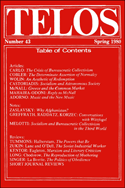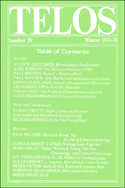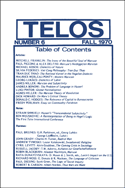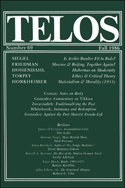By Tomash Dabrowski · Tuesday, October 2, 2012 As an occasional feature on TELOSscope, we highlight a past Telos article whose critical insights continue to illuminate our thinking and challenge our assumptions. Today, Tomash Dabrowski looks at Richard Wolin’s “An Aesthetic of Redemption: Benjamin’s Path to Trauerspiel“ from Telos 43 (Spring 1980).
 Despite renewed interest in Walter Benjamin, his work still remains enigmatic seventy years after his death, and the obscurity of his thought is compounded by the efforts of friends and associates wishing to reclaim his work to their respective traditions. Those who knew him during his lifetime—and especially those instrumental to the belated dissemination of his work—sometimes repudiate his theological motifs, others his particular variant of Marxism (or questioning whether he could be called a Marxist at all). But there seems to be a consensus as to their incongruity. Adorno for instance once chastised Benjamin’s work as “undialectical,” and Gershom Scholem found his theology to be plagued by ill-conceived communist alliances (which is to say nothing about his dispute with Hannah Arendt about which school of thought Benjamin’s contribution legitimately lies). Leszek Kołakowski’s reading, in his eminent Main Currents of Marxism, is emblematic of the mischief caused by measuring Benjamin’s work against the weight of tradition. Kołakowski finds that Benjamin “seems to have tried to graft historical materialism on his own theory of culture, which had nothing to do with Marxism and which he had worked out beforehand.” Despite renewed interest in Walter Benjamin, his work still remains enigmatic seventy years after his death, and the obscurity of his thought is compounded by the efforts of friends and associates wishing to reclaim his work to their respective traditions. Those who knew him during his lifetime—and especially those instrumental to the belated dissemination of his work—sometimes repudiate his theological motifs, others his particular variant of Marxism (or questioning whether he could be called a Marxist at all). But there seems to be a consensus as to their incongruity. Adorno for instance once chastised Benjamin’s work as “undialectical,” and Gershom Scholem found his theology to be plagued by ill-conceived communist alliances (which is to say nothing about his dispute with Hannah Arendt about which school of thought Benjamin’s contribution legitimately lies). Leszek Kołakowski’s reading, in his eminent Main Currents of Marxism, is emblematic of the mischief caused by measuring Benjamin’s work against the weight of tradition. Kołakowski finds that Benjamin “seems to have tried to graft historical materialism on his own theory of culture, which had nothing to do with Marxism and which he had worked out beforehand.”
Continue reading →
By Tomash Dabrowski · Tuesday, May 29, 2012 As an occasional feature on TELOSscope, we highlight a past Telos article whose critical insights continue to illuminate our thinking and challenge our assumptions. Today, Tomash Dabrowski looks at Karl Korsch’s “Ten Theses on Marxism Today,” from Telos 26 (Winter 1975–76).
 Although the work of Karl Korsch was cardinal to subsequent theoretical developments within the twentieth-century Marxist canon, the appreciation of his work is usually eclipsed in intellectual history by the long shadow cast by Lukács over the development of what would later be called “Western Marxism.” Nevertheless, the belated rediscovery of Korsch’s work by the New Left was certainly in part due to the fact that Korsch’s position was the more heretical in the eyes of the Soviet variant of Marxist orthodoxy. Although Lukács dismissed the dogmatic hagiography of Marx’s conclusions, he nevertheless introduced his magnum opus, History and Class Consciousness, with the “scientific conviction” in the method of dialectical materialism. Even provided that all of Marx’s findings would be proven false, genuine Marxist method would nevertheless yield a privileged relationship to history. Although the work of Karl Korsch was cardinal to subsequent theoretical developments within the twentieth-century Marxist canon, the appreciation of his work is usually eclipsed in intellectual history by the long shadow cast by Lukács over the development of what would later be called “Western Marxism.” Nevertheless, the belated rediscovery of Korsch’s work by the New Left was certainly in part due to the fact that Korsch’s position was the more heretical in the eyes of the Soviet variant of Marxist orthodoxy. Although Lukács dismissed the dogmatic hagiography of Marx’s conclusions, he nevertheless introduced his magnum opus, History and Class Consciousness, with the “scientific conviction” in the method of dialectical materialism. Even provided that all of Marx’s findings would be proven false, genuine Marxist method would nevertheless yield a privileged relationship to history.
Continue reading →
By Tomash Dabrowski · Tuesday, April 3, 2012 As an occasional feature on TELOSscope, we highlight a past Telos article whose critical insights continue to illuminate our thinking and challenge our assumptions. Today, Tomash Dabrowski looks at Maurice Merleau-Ponty’s “Western Marxism,” from Telos 6 (Fall 1970).
 Prior to 1960, the work of György Lukács was largely unknown in France; Lukács’s work had only belatedly gained influence there with Lucien Goldmann’s translation of History and Class Consciousness almost forty years after its first publication, and five years after the 1955 publication of Merleau-Ponty’s study of his work in Les Aventures de la Dialectique. Merleau-Ponty had in a sense anticipated the French debates on Lukács’s otherwise eminent text, already having cited passages from History and Class Consciousness in 1946. “Western Marxism,” however, is a meditation on a Marxism far removed from the type that Merleau-Ponty was enthusiastic about almost ten years prior. Until 1950 his political commitments were supportive, albeit cautiously, toward the Soviet project; the present work is however concurrent with a disillusionment of institutionalized Marxism, a cynicism that had grown in Merleau-Ponty since the Korean War. Prior to 1960, the work of György Lukács was largely unknown in France; Lukács’s work had only belatedly gained influence there with Lucien Goldmann’s translation of History and Class Consciousness almost forty years after its first publication, and five years after the 1955 publication of Merleau-Ponty’s study of his work in Les Aventures de la Dialectique. Merleau-Ponty had in a sense anticipated the French debates on Lukács’s otherwise eminent text, already having cited passages from History and Class Consciousness in 1946. “Western Marxism,” however, is a meditation on a Marxism far removed from the type that Merleau-Ponty was enthusiastic about almost ten years prior. Until 1950 his political commitments were supportive, albeit cautiously, toward the Soviet project; the present work is however concurrent with a disillusionment of institutionalized Marxism, a cynicism that had grown in Merleau-Ponty since the Korean War.
Continue reading →
By Tomash Dabrowski · Tuesday, March 27, 2012 As an occasional feature on TELOSscope, we highlight a past Telos article whose critical insights continue to illuminate our thinking and challenge our assumptions. Today, Tomash Dabrowski looks at Max Horkheimer’s “Materialism and Morality,” from Telos 69 (Fall 1986).
 In 1933, the rise of National Socialism had terminated the Frankfurt School’s residency in Germany, and “Materialism and Morality” marks the last contribution by Max Horkheimer to the Institute’s journal, the Zeitschrift für Sozialforschung, while still located in Frankfurt. In this respect, the present essay is a macrocosm of the development of the thought of the Frankfurt School at the cusp of exile. Key concepts in Horkheimer’s more widely known mature work already germinate in “Materialism and Morality,” but the essay’s unique position in his individual intellectual development likewise straddles the ongoing process of elaborating a cohesive sociological vision for the institute. The still nascent idea of a “Critical Theory,” which is now synonymous with the school, had yet to wait four years to be coined by Horkheimer; indeed “Materialism and Morality” is part of a still continuing clarification of what an interdisciplinary critical method might look like in application. In 1933, the rise of National Socialism had terminated the Frankfurt School’s residency in Germany, and “Materialism and Morality” marks the last contribution by Max Horkheimer to the Institute’s journal, the Zeitschrift für Sozialforschung, while still located in Frankfurt. In this respect, the present essay is a macrocosm of the development of the thought of the Frankfurt School at the cusp of exile. Key concepts in Horkheimer’s more widely known mature work already germinate in “Materialism and Morality,” but the essay’s unique position in his individual intellectual development likewise straddles the ongoing process of elaborating a cohesive sociological vision for the institute. The still nascent idea of a “Critical Theory,” which is now synonymous with the school, had yet to wait four years to be coined by Horkheimer; indeed “Materialism and Morality” is part of a still continuing clarification of what an interdisciplinary critical method might look like in application.
Continue reading →
|
|
 Despite renewed interest in Walter Benjamin, his work still remains enigmatic seventy years after his death, and the obscurity of his thought is compounded by the efforts of friends and associates wishing to reclaim his work to their respective traditions. Those who knew him during his lifetime—and especially those instrumental to the belated dissemination of his work—sometimes repudiate his theological motifs, others his particular variant of Marxism (or questioning whether he could be called a Marxist at all). But there seems to be a consensus as to their incongruity. Adorno for instance once chastised Benjamin’s work as “undialectical,” and Gershom Scholem found his theology to be plagued by ill-conceived communist alliances (which is to say nothing about his dispute with Hannah Arendt about which school of thought Benjamin’s contribution legitimately lies). Leszek Kołakowski’s reading, in his eminent Main Currents of Marxism, is emblematic of the mischief caused by measuring Benjamin’s work against the weight of tradition. Kołakowski finds that Benjamin “seems to have tried to graft historical materialism on his own theory of culture, which had nothing to do with Marxism and which he had worked out beforehand.”
Despite renewed interest in Walter Benjamin, his work still remains enigmatic seventy years after his death, and the obscurity of his thought is compounded by the efforts of friends and associates wishing to reclaim his work to their respective traditions. Those who knew him during his lifetime—and especially those instrumental to the belated dissemination of his work—sometimes repudiate his theological motifs, others his particular variant of Marxism (or questioning whether he could be called a Marxist at all). But there seems to be a consensus as to their incongruity. Adorno for instance once chastised Benjamin’s work as “undialectical,” and Gershom Scholem found his theology to be plagued by ill-conceived communist alliances (which is to say nothing about his dispute with Hannah Arendt about which school of thought Benjamin’s contribution legitimately lies). Leszek Kołakowski’s reading, in his eminent Main Currents of Marxism, is emblematic of the mischief caused by measuring Benjamin’s work against the weight of tradition. Kołakowski finds that Benjamin “seems to have tried to graft historical materialism on his own theory of culture, which had nothing to do with Marxism and which he had worked out beforehand.”  Although the work of Karl Korsch was cardinal to subsequent theoretical developments within the twentieth-century Marxist canon, the appreciation of his work is usually eclipsed in intellectual history by the long shadow cast by Lukács over the development of what would later be called “Western Marxism.” Nevertheless, the belated rediscovery of Korsch’s work by the New Left was certainly in part due to the fact that Korsch’s position was the more heretical in the eyes of the Soviet variant of Marxist orthodoxy. Although Lukács dismissed the dogmatic hagiography of Marx’s conclusions, he nevertheless introduced his magnum opus, History and Class Consciousness, with the “scientific conviction” in the method of dialectical materialism. Even provided that all of Marx’s findings would be proven false, genuine Marxist method would nevertheless yield a privileged relationship to history.
Although the work of Karl Korsch was cardinal to subsequent theoretical developments within the twentieth-century Marxist canon, the appreciation of his work is usually eclipsed in intellectual history by the long shadow cast by Lukács over the development of what would later be called “Western Marxism.” Nevertheless, the belated rediscovery of Korsch’s work by the New Left was certainly in part due to the fact that Korsch’s position was the more heretical in the eyes of the Soviet variant of Marxist orthodoxy. Although Lukács dismissed the dogmatic hagiography of Marx’s conclusions, he nevertheless introduced his magnum opus, History and Class Consciousness, with the “scientific conviction” in the method of dialectical materialism. Even provided that all of Marx’s findings would be proven false, genuine Marxist method would nevertheless yield a privileged relationship to history.  Prior to 1960, the work of György Lukács was largely unknown in France; Lukács’s work had only belatedly gained influence there with Lucien Goldmann’s translation of History and Class Consciousness almost forty years after its first publication, and five years after the 1955 publication of Merleau-Ponty’s study of his work in Les Aventures de la Dialectique. Merleau-Ponty had in a sense anticipated the French debates on Lukács’s otherwise eminent text, already having cited passages from History and Class Consciousness in 1946. “Western Marxism,” however, is a meditation on a Marxism far removed from the type that Merleau-Ponty was enthusiastic about almost ten years prior. Until 1950 his political commitments were supportive, albeit cautiously, toward the Soviet project; the present work is however concurrent with a disillusionment of institutionalized Marxism, a cynicism that had grown in Merleau-Ponty since the Korean War.
Prior to 1960, the work of György Lukács was largely unknown in France; Lukács’s work had only belatedly gained influence there with Lucien Goldmann’s translation of History and Class Consciousness almost forty years after its first publication, and five years after the 1955 publication of Merleau-Ponty’s study of his work in Les Aventures de la Dialectique. Merleau-Ponty had in a sense anticipated the French debates on Lukács’s otherwise eminent text, already having cited passages from History and Class Consciousness in 1946. “Western Marxism,” however, is a meditation on a Marxism far removed from the type that Merleau-Ponty was enthusiastic about almost ten years prior. Until 1950 his political commitments were supportive, albeit cautiously, toward the Soviet project; the present work is however concurrent with a disillusionment of institutionalized Marxism, a cynicism that had grown in Merleau-Ponty since the Korean War.  In 1933, the rise of National Socialism had terminated the Frankfurt School’s residency in Germany, and “Materialism and Morality” marks the last contribution by Max Horkheimer to the Institute’s journal, the Zeitschrift für Sozialforschung, while still located in Frankfurt. In this respect, the present essay is a macrocosm of the development of the thought of the Frankfurt School at the cusp of exile. Key concepts in Horkheimer’s more widely known mature work already germinate in “Materialism and Morality,” but the essay’s unique position in his individual intellectual development likewise straddles the ongoing process of elaborating a cohesive sociological vision for the institute. The still nascent idea of a “Critical Theory,” which is now synonymous with the school, had yet to wait four years to be coined by Horkheimer; indeed “Materialism and Morality” is part of a still continuing clarification of what an interdisciplinary critical method might look like in application.
In 1933, the rise of National Socialism had terminated the Frankfurt School’s residency in Germany, and “Materialism and Morality” marks the last contribution by Max Horkheimer to the Institute’s journal, the Zeitschrift für Sozialforschung, while still located in Frankfurt. In this respect, the present essay is a macrocosm of the development of the thought of the Frankfurt School at the cusp of exile. Key concepts in Horkheimer’s more widely known mature work already germinate in “Materialism and Morality,” but the essay’s unique position in his individual intellectual development likewise straddles the ongoing process of elaborating a cohesive sociological vision for the institute. The still nascent idea of a “Critical Theory,” which is now synonymous with the school, had yet to wait four years to be coined by Horkheimer; indeed “Materialism and Morality” is part of a still continuing clarification of what an interdisciplinary critical method might look like in application. 






